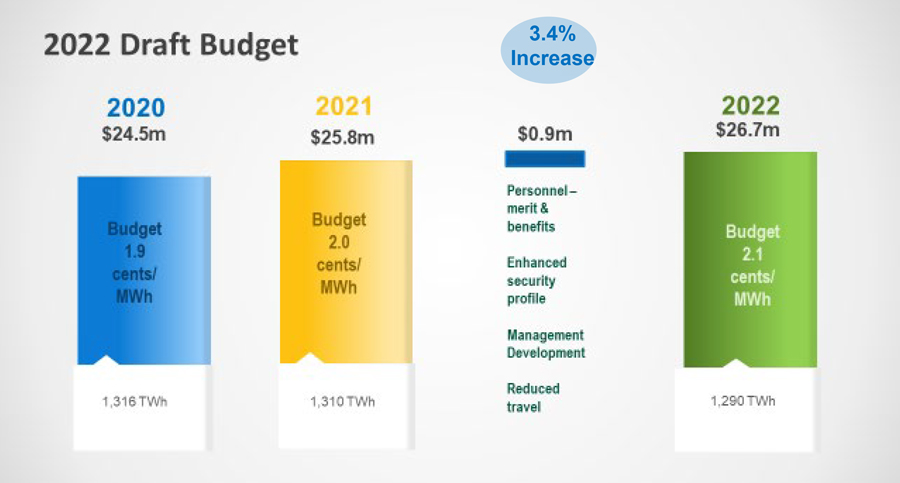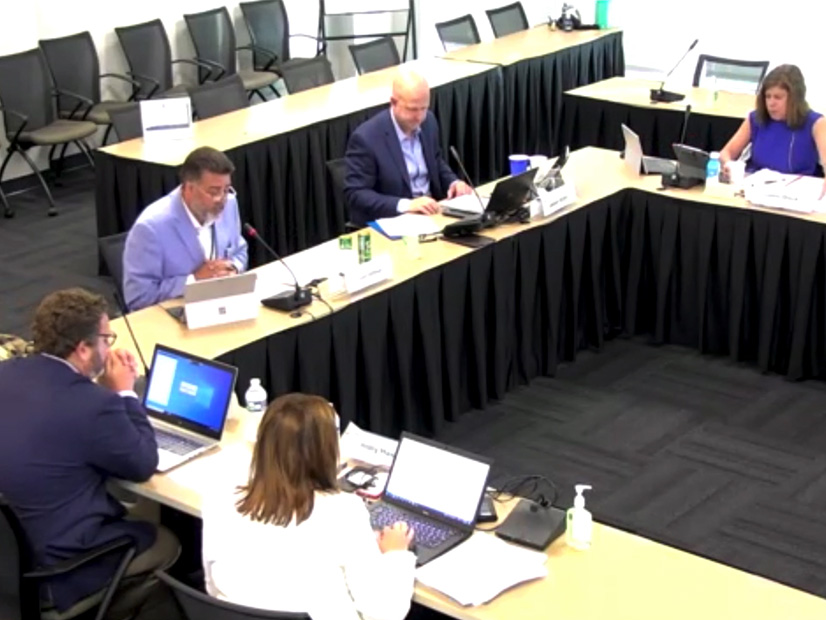[EDITOR’S NOTE: An earlier version of this story erroneously stated that SERC’s goal was to return employees to a normal five-day office work week by the end of July.]
Phased Reopening Underway at Charlotte Office
SERC Reliability’s return-to-office plan is well underway, management said on Thursday at the regional entity’s first partial in-person meeting since the beginning of the COVID-19 pandemic.
“It’s wonderful to be here [and] see humans with the full bodies, and not just heads,” CEO Jason Blake joked in his opening remarks at SERC’s office in Charlotte, N.C. Blake was joined in the office by officers and members of SERC’s Board of Directors from the Charlotte area, with all other attendees participating remotely.
“It’s been a very surreal experience, and it feels very nice to be on the other side where we’re starting to return to normalcy,” he continued. “It seems like we all got very comfortable with the ‘new normal,’ and now as we’re moving back into normalcy, it feels like now we’re trying again to get comfortable with the way things were. … It’s been a lot of work for us.”
SERC began to allow voluntary returns to the office in January; the goal at the time was to begin a phased “hard opening” by March 1 aimed at getting all employees back to the office.
However, because of a rise in COVID-19 cases in North Carolina, the full reopening was postponed to June. Instead, only executives were required to return to the office in March — “to be the canaries in the coal mine,” as Blake put it. The following month, managers were ordered to return.
This month the rest of the staff returned; however, rather than bring everyone in at once, management has been easing people in by requiring only one day of in-person attendance for the first few weeks and then adding a day every week or two. Currently employees are required to work in the office at least two days a week. Starting July 12 they will come in at least three days a week; this policy will remain in effect for the foreseeable future.
“The first point that has really driven us and guided us through all of this is the health and safety of our staff and a strong commitment to follow the science, although the science has been malleable over the course of this,” Blake said. “But we’ve stayed very true to that, and now we feel very confident to be in a position to start reintroducing folks.”
Members Review Financial Measures, Budget
The board voted to approve SERC’s final 2022 business plan and budget for submission to NERC, along with changes to the RE’s cash investment policy.
SERC is targeting a budget of $26.7 million next year, representing a 3.4% increase over the budget for 2021. Staff of the Finance and Audit Committee (FAC) participating in the meeting reminded members that this is the smallest planned budget increase among NERC and the other REs; the next smallest is WECC, with 4%, while the Texas Reliability Entity has the biggest increase at 20.8%.

SERC’s proposed assessment for 2022 is $24.8 million, up 5.5% over 2021. The RE plans to make up the difference between the assessment and budget with unused penalty monies from the previous year, as well as by releasing $1.2 million from its Assessment Stabilization Reserve.
The largest reason for the rising budget is staffing, with a merit-based pay increase and an increase in employee benefit costs driving a $1.2 million increase in personnel expenses. SERC is also adding staff, with four full-time-equivalent positions to be added, helping to “drive a stronger and more robust internal IT team.” Three of the four FTEs are budget-neutral.
Offsetting the spending in personnel is an expected $102,000 decrease in meetings and travel because of “efficiencies realized in SERC’s compliance monitoring audit process”; this refers to some of the innovative approaches to audits that RE staff had to devise in response to restrictions on in-person meetings because of the pandemic. (See SERC Seeks to Streamline Audits Post-Pandemic.) In addition, SERC expects to reduce its spending on consultants and contracts by $386,000.
The changes to SERC’s cash investment policy are intended to “provide more specificity regarding investment restrictions” on the RE’s funds, specifically with regard to investments in the energy sector. Previously the policy prohibited all energy-related investments; the update clarifies this restriction to permit purchasing securities in the following subsectors, provided that the issuer is not a NERC registered entity or its affiliate:
- gas distribution;
- oil field equipment services;
- oil refining and marketing; and
- non-electric utilities.
“There’s an attempt here to be very specific about avoiding investments in NERC registered entities and the electric utility space, as that’s defined in the restrictions, but recognizing that there are other energy sectors that are open for investment and actually could make a positive difference in terms of managing cash reserves for SERC,” FAC Chair Lisa Johnson said.
Regional Standard Gains Board Approval
The board also voted to adopt regional reliability standard PRC-006-SERC-3 (Automatic underfrequency load shedding requirements), intended to “establish consistent and coordinated requirements for the design, implementation and analysis of automatic underfrequency load shedding (UFLS) programs among all SERC applicable entities.”
The new regional standard replaces PRC-006-SERC-2 and will serve as the equivalent of NERC’s PRC-006-3, adopted in 2017. SERC’s standard “has more stringent requirements compared to NERC’s continent-wide standard,” Gaurav Karandikar, SERC’s manager of reliability assessment and performance analysis and technical services, told the board.
SERC undertook the latest revisions to the standard after taking over the footprint of the Florida Reliability Coordinating Council in 2019, Karandikar explained. The new version incorporates three major changes:
- elimination of a requirement to maintain a database of over- and under-frequency tripping data;
- removal of a requirement for subregion island boundaries to be contiguous for the benefit of UFLS program planners; and
- an update to frequency set points and load-shed percentages “to accommodate the unique bulk power system characteristics of the Florida peninsula.”
Following the board’s approval, the standard will be submitted to NERC and FERC for final approval.




